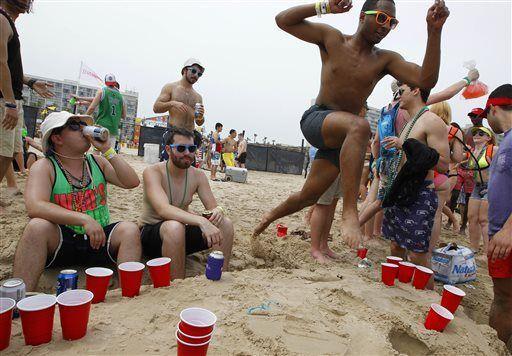Spring break has long been known as the time for beach vacations, partying and no reservations. However, like everything, there’s a time, place and limit for how much is too much.
Each spring, much of the University’s population floods the beaches along the Gulf Coast, including popular destinations such as Gulf Shores, Alabama and Destin, Florida.
Every year, students continue to damage the University’s distinguished reputation, with the number of arrests, violence and crime increasing in the area during spring break.
Proudly displaying their LSU flags from balconies and shouting the widely-known student-improvised lyrics of “Neck,” the entire beach knows the Fighting Tigers have arrived.
However, University students were not warmly received by the local government of Gulf Shores, and with good reason.
On March 18, the Gulf Shores City Council voted unanimously to ban the consumption of alcoholic beverages on Gulf beaches within city limits. The ordinance was adopted specifically with spring breakers in mind, and will be in effect until April 17.
The City Council stated it feels the “prolonged consumption of alcohol this year is directly associated with undesirable behavior and an increased risk to public safety.”
The new policy is spurred from previous vacation incidents like last year’s roadside bust, where four underage University students were found in possession of over 100 cases of beer, five liters of boxed wine and eight bottles of liquor. The students were transporting the alcohol in a trailer to Gulf Shores for spring break before being pulled over in Alabama for an expired tag, as reported by Nola.com | The Times Picayune.
Incidents like this, involving large amounts of alcohol, lead to other negative spring break experiences including eviction from rented beach houses and condos for noise complaints and excessive public intoxication.
Not only does reckless vacationing harm the University’s respected stature, it’s also incredibly dangerous to students.
Binge drinking is a norm during “spreak,” where students prefer a state of prolonged intoxication.
“Physicians see the effects of intoxication at three to five times the legal limit: injuries from high-speed car and Jet Ski accidents, pumped stomachs, broken legs and spinal compressions from balcony falls, and, maybe once a day, date rape,” according to “Spring Break ‘00 No Cares, No Parents, No Inhibitions” by USA Today.
According to the National Institute on Alcohol Abuse and Alcoholism, 1,825 college students between the ages of 18 and 24 die each school year from alcohol-related unintentional injuries.
Date rapes and sexual battery become a common occurrence during the drug and alcohol fueled respite. Spring break is a high risk zone for unprotected sex and the transfer of sexually transmitted diseases.
In 2015, Panama City Beach charged two college students for gang raping a 19-year-old woman on a public beach in broad daylight. Hundreds of bystanders did nothing to prevent the attack and graphic video footage of the incident was later released.
During spring break, the average male reported drinking 18 drinks per day and the average woman reported 10 drinks per day. More than half of all men and more than 40 percent of all women drank until they became sick or passed out at least once, according to a study done by the Journal of American College Health.
Spring break also presents an environmental problem with inebriated college students trashing the public beaches and surrounding areas, leaving law enforcement and good citizens to clean up after their mess.
Students should do themselves a favor and party responsibly. Spring break is a marathon, not a sprint. Students should drink less and in moderation, clean up after themselves, and favor small gatherings over grand-scale blowouts. Act appropriately in the family-friendly environment and be prepared to accept the consequences when not in accordance with local laws.
Avoid imitating the stereotypical spring break culture that is depicted within entertainment and media. Students are constantly pushing the limit of what is considered socially acceptable behavior, with bigger parties and more evictions every year. Not being stupid or obnoxious isn’t a radical thing to ask — the real world won’t appreciate those beer pong pictures on social media or that DUI charge.
Students can still have a good time and make memories without hurting themselves and others in the process.
Lauren Heffker is an 18-year-old mass communication freshman from Mandeville, Louisiana.
OPINION: Extreme spring breaks gives University bad reputation
March 28, 2016

Ross House jumps over a beer pong game while celebrating spring break on the beach Thursday, March 17, 2016, at South Padre Island, Texas. (Nathan Lambrecht/The Monitor via AP)
More to Discover







